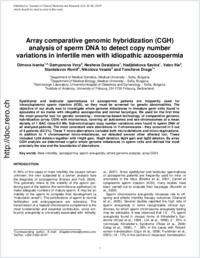Array comparative genomic hybridization (CGH) analysis of sperm DNA to detect copy number variations in infertile men with idiopathic azoospermia
- Dimova, Ivanka Department of Medical Genetics, Medical University – Sofia, Bulgaria - Institute of Anatomy, University of Fribourg, Switzerland
- Damyanova, Vera Department of Medical Biology, Medical University – Sofia, Bulgaria
- Nesheva, Desislava Department of Medical Genetics, Medical University – Sofia, Bulgaria
- Hadjidekova, Savina Department of Medical Genetics, Medical University – Sofia, Bulgaria
- Vatev, Ilia Department of Medical Biology, Medical University – Sofia, Bulgaria
- Stanislavov, Romil Seminologic Laboratory, University Hospital of Obstetrics and Gynecology – Sofia, Bulgaria
- Nikolova, Vesela Seminologic Laboratory, University Hospital of Obstetrics and Gynecology – Sofia, Bulgaria
- Toncheva, Draga Department of Medical Genetics, Medical University – Sofia, Bulgaria
-
2010
Published in:
- Journal of Clinical Medicine and Research. - 2010, vol. 2, no. 3, p. 42-48
English
Epididymal and testicular spermatozoa of azoospermic patients are frequently used for intracytoplasmic sperm injection (ICSI), so they must be screened for genetic abnormalities. The objective of our study was to investigate whole genome imbalances in immature germ cells found in ejaculates of six males with idiopathic azoospermia and normal karyotype. We used for the first time the most powerful tool for genetic screening - microarray-based technology of comparative genomic hybridization (array CGH) with microarrays, covering all autosomes and sex-chromosomes at a mean density of 1 BAC clone/0.5 Mb. Sub-microscopic copy number variations were found in sperm DNA of all analyzed patients. The most consistent were aberrations in Y-chromosome - they occurred in 5 out of 6 patients (83.3%). These Y micro-aberrations included both micro-deletions and micro-duplications. In addition to Y chromosomal micro-imbalances, we detected several other affected loci. These included 1р36 deletion together with 14q24 gain, 16q24 deletion, 9q34 gain and 3q29 deletion. By array CGH analysis we determined cryptic whole genome imbalances in sperm cells and defined the most precisely the size and the boundaries of aberrations.
- Faculty
- Faculté des sciences et de médecine
- Department
- Département de Médecine
- Language
-
- English
- Classification
- Biological sciences
- License
-
License undefined
- Identifiers
-
- RERO DOC 17514
- DOI 10.5897/JCMR.9000011
- Persistent URL
- https://folia.unifr.ch/unifr/documents/301563
Statistics
Document views: 102
File downloads:
- pdf: 177
